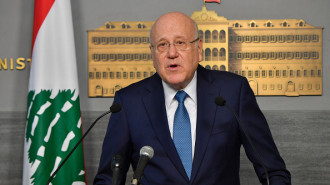Breadcrumb
Fake Sheikh: US man who impersonated Saudi prince for three decades jailed for fraud
Anthony Gignac was able to live a life of luxury despite multiple arrests as he hopped from state to state passing himself off as Prince Khalid al-Saud of Saudi Arabia, according to The New York Times.
It needn't have mattered that the real Prince Khalid is a 79-year-old man who likely spends most of his time in Mecca, the province he has governed intermittently for more than a decade, and Gignac is a Colombian-American nearly half his age - the conman was able to pull off scam after scam across the US until 2017, when he was arrested and charged for using a fake identity in an attempt to defraud investors out of more than $8 million.
Gignac draped himself with the appearance of a man with millions of dollars to burn - decked out in Rolex watches, Cartier bracelets and designer clothes, living in a Miami penthouse and driving a Ferrari - but his long-term scam had small beginnings.
Gignac obtained a California state ID card under the name of Khalid al-Saud in 1987, prosecutors said.
Since then, he has been arrested 11 times for "prince-related schemes".
In 1991, he pleaded no contest to cheating a limousine company and the Regent Beverly Wilshire Hotel - the luxury hotel featured in the film Pretty Woman - out of more than $10,000.
Once caught, Gignac appeared to move to other states in order to continue the con.
In 2006, he pleaded guilty to impersonating a diplomat and attempted bank fraud in Michigan.
He had charged more than $28,000 in purchases at lavish department stores Saks Fifth Avenue and Neiman Marcus to the account of a real Saudi royal.
Gignac's lawyer at the time said in a 2007 sentencing memorandum that his strange behaviour was the result, at least in part, of childhood trauma.
He was a homeless child in Colombia before being adopted in 1977, with the divorce of his adoptive parents also causing trauma, according to lawyer Karen J Davis Roberts.
Gignac spent more than a year and a half of his teenage years in mental hospitals and later ran away from home at 17.
He told prosecutors in 2007 that at the same age, he had begun having sex with male members of the Saudi royal family, but was later cut off.
"This is one of the most powerful families in the world. They are secretive. There is no information about these people on the internet. They have private ongoings. Who could I, without help, influence? I am so close to them," he said, according to a transcript.
When he was released in 2017, Gignac went straight back to impersonating Prince Khalid in Florida.
He bought fake Diplomatic Security Service badges for his bodyguards and fake diplomatic license plates for his cards, prosecutors said.
When he met with potential investors, he demanded expensive gifts and handed out business guards that referred to himself as "his royal highness", "prince" and "sultan".
On his Instagram under the handle "@princedubai_07", Gignac showed off his jewellery, dog and cars, flashed American Express black cards while dining in five-star restaurants and drinking expensive alcohol, and occasionally dropped photos of real Saudi royals, who he referred to as family members.
He also sent out celebratory messages for Ramadan and Eid.
The doctored online and offline personality of a Saudi royal was used by Gignac to lure investors into nonexistent business ventures, including a casino in Malta and a pharmaceutical company in Ireland.
He even offered investors the chance to buy a stake in Saudi Arabia's state oil company, Saudi Aramco.
But Gignac was busted two years ago when he tried to buy a hotel in Miami, prosecutors said.
He offered the owners $440 million and showed them forged documents from the Bank of Dubai granting him a $600 million loan.
But Gignac's erratic behaviour made the owners suspicious, prosecutors said.
After they hired a private security group to investigate their potential business partner, investigators learned the truth.






![Anthony Blinken speech [Getty] Anthony Blinken speech [Getty]](/sites/default/files/styles/image_684x385/public/media/images/6263436E-8ACD-4D3C-9055-25A7BE79DD5A.jpg?h=d1cb525d&itok=fLHmHCRG)
 Follow the Middle East's top stories in English at The New Arab on Google News
Follow the Middle East's top stories in English at The New Arab on Google News


![Paula Yacoubian was verbally attacked by Salim Aoun during a parliamentary session [Getty]](/sites/default/files/styles/image_330x185/public/1150162486.jpeg?h=b9615360&itok=xysBxMUJ)